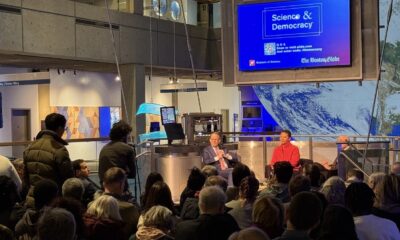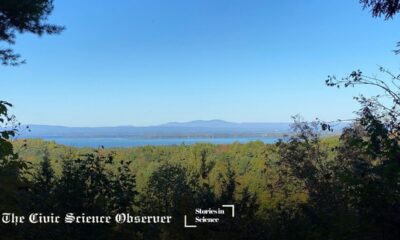Stories in Science Special Series
An Unexpected Path: Discovering my Passion for Science Outreach and Administration
Heather McKellar: I have been lucky to follow in the footsteps of strong mentors and lean a supportive network of peers. They have all taught me to step outside of my comfort zone and take advantage of the opportunities to learn new things and meet new people.

Heather McKellar
[su_boxbox title=”About”]Dr. Heather McKellar earned her Ph.D. in Cellular, Molecular, and Biophysical Studies from Columbia University and her B.A. in Biology from Boston University. During her graduate training she helped start the Columbia University Neuroscience Outreach Group, which led to the 2011 Next Generation Award from the Society for Neuroscience. She joined the Neuroscience Institute in September 2011, about a month after its official start date, as an admin assistant supporting two labs. Heather founded the Neuroscience Outreach Group at NYU (NOGN) in 2011 and hosted the first NYU Community Brain Fair during Brain Awareness Week 2012. Her interest in outreach also led her to serve as the President of the Greater New York Chapter of the Society for Neuroscience (braiNY) from 2015-2018 and continue as a member of its executive board. When Nina Gray became the Administrative Director in 2013, Heather took over the management of the graduate program and numerous projects in the areas of community engagement. This past June she was promoted to be the third Executive Director of the Neuroscience Institute, working closely with Dick Tsien and overseeing a team of 12 staff members. The story below is co-published in collaboration with Growing up in Science.[/su_boxbox]
[su_boxnote note_color=”#c8c8c8″]Some Key Points:
- Look for mentors who will help you find your passion and give you the space to take on new projects that allow you to grow.
- Keep an open mind and always be on the lookout for unexpected opportunities.[/su_boxnote]
[dropcap]I [/dropcap]was born and raised in a small town in the northwest corner of Connecticut. I learned to love education and bureaucracy (kidding) from my special-education-teacher mom and state-employee dad. I was an incredibly shy child who learned about imposter syndrome early when I attended an elite boarding school as a day student. But, I also found my love of science in the school’s state-of-the-art classroom labs where I dissected my first fetal pig and applied for my first fellowship.

Dr. Heather McKellar
I went to Boston University as a way to broaden my horizons and escape small town CT for the city. While I took classes that ranged from molecular biology to abnormal psychology and even toyed with the idea of pre-med, it wasn’t until I got into a lab the summer before my junior year that I truly settled on neuroscience as my major. I found a lab that integrated the topics I learned in my classes and encouraged undergraduate students to develop their own projects.
Having some good friends in the lab and a postdoc colleague who was an excellent mentor kept me going through the end of my doctorate.
After graduation, I didn’t have a plan until a friend convinced me to move to NYC. So, I sent a bunch of letters (by mail!) and received an offer to be a technician with Rae Silver at Columbia. After not getting into the neuroscience graduate program at Columbia, Rae Silver saw promise (or took pity) in me and helped my application find its way to the Integrated Program. Unfortunately, that is where I slowly realized that lab life was not for me. While I enjoyed the day to day of my work studying the cellular and molecular changes in a mouse model of psychiatric disease, I became jaded by the lack of significant findings and cut-throat nature of everything from submitting abstracts to getting time on the confocal microscope.
A fellow student dragged me to an outreach classroom visit as a way to recharge, and I became hooked. I helped organize the early stages of the Columbia University Neuroscience Outreach Group and made the connections with the Greater New York Chapter of the Society for Neuroscience (braiNY), the New York Academy of Sciences, and Dana Foundation that led to my job with NYU and my role as President of braiNY.
Having some good friends in the lab and a postdoc colleague who was an excellent mentor kept me going through the end of my doctorate. But I took the opportunity in my last two years to volunteer more and find leadership positions where possible. At the end of graduate school, I realized that outreach could be a career when my friend was named Director of Neuroscience Outreach at Columbia’s new Zuckerman Institute. I emailed some scientific connections at the new Neuroscience Institute at the NYU School of Medicine, and my letter ended up on the desk of the new Executive Director who convinced me to come on as an admin assistant who would receive mentorship from the PhDs on the administrative team and have spare time to develop an outreach program. I found exactly what I was looking for in the new Neuroscience Institute at NYU — a community that was founded to build bridges between labs and departments and prized education and innovation.
I quickly took on more and more and more tasks and projects as I progressed in my career at NYU. This past May, I started my new role as Executive Director and I am still learning the ins and outs. In my free time, I love to cook with my fiancé, have wine nights with my friends from Columbia that are a wonderful and supportive network, and do arts and crafts with my nieces and nephew. I rely on outreach and my volunteer positions to recharge and my favorite item in my office remains the plastinated human brain.
I have been lucky to follow in the footsteps of strong mentors and lean a supportive network of peers. They have all taught me to step outside of my comfort zone and take advantage of the opportunities to learn new things and meet new people. This has led to a career that ten years ago I did not know existed and a position that continues to be interesting and challenging.
Metrics
Sessions
Total number of Sessions. A session is the period time a user is actively engaged with the page.
Visitors
Users that have had at least one session within the selected date range. Includes both new and returning users.
Page views
Pageviews is the total number of time the article was viewed. Repeated views are counted.
The CS Media Lab is a Boston-anchored civic science news collective with local, national and global coverage on TV, digital print, and radio through CivicSciTV, CivicSciTimes, and CivicSciRadio. Programs include Questions of the Day, Changemakers, QuickTake, Consider This Next, Stories in Science, Sai Resident Collective and more.

-
 Audio Studio1 month ago
Audio Studio1 month ago“Reading it opened up a whole new world.” Kim Steele on building her company ‘Documentaries Don’t Work’
-
Civic Science Observer1 week ago
‘Science policy’ Google searches spiked in 2025. What does that mean?
-
Civic Science Observer1 month ago
Our developing civic science photojournalism experiment: Photos from 2025
-
Civic Science Observer1 month ago
Together again: Day 1 of the 2025 ASTC conference in black and white
Contact
Menu
Designed with WordPress
























